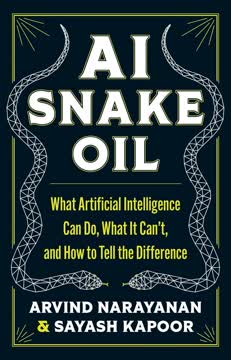Key Takeaways
1. Surveillance capitalism: A new economic order that claims human experience as free raw material
Surveillance capitalism unilaterally claims human experience as free raw material for translation into behavioral data.
Origins at Google. Surveillance capitalism emerged at Google in the early 2000s when the company discovered it could extract and analyze user data to predict user behavior. This "behavioral surplus" became the foundation for targeted advertising, Google's main revenue source.
Spread to other companies. The model quickly spread to other tech giants like Facebook, Microsoft, and Amazon. It has now permeated various sectors including retail, finance, and healthcare.
Key characteristics:
- Extraction of user data without meaningful consent
- Use of advanced analytics and machine learning to create prediction products
- Sale of these predictions in behavioral futures markets
- Goal of modifying user behavior to align with paying customers' interests
2. The rise of Big Other: Ubiquitous digital architecture for behavior modification
Big Other is a ubiquitous digital architecture of sensors, smart devices, and algorithms designed to extract data and shape behavior.
Pervasive sensing. The Internet of Things, smartphones, wearables, and other smart devices create a vast network of sensors that continuously monitor our activities, emotions, and environments.
Data extraction and analysis. This sensory network feeds an ever-growing pool of behavioral data, which is analyzed using artificial intelligence to create detailed profiles and predictions about individuals and groups.
Behavior modification capabilities:
- Real-time interventions to nudge behavior
- Personalized manipulation of information and choices
- Automated decision-making that affects individuals' opportunities and experiences
3. The reality business: Expansion of surveillance capitalism from virtual to physical world
The prediction imperative drives surveillance capitalism far into the intimate reaches of our daily lives and deep into our personalities and our emotions.
Beyond the screen. Surveillance capitalism has expanded from online tracking to monitoring real-world behaviors through smart home devices, connected cars, and urban sensing networks.
Commodification of reality. Physical spaces and experiences are increasingly digitized and monetized, creating new markets for behavioral data and prediction products.
Examples of reality business:
- Smart cities with ubiquitous sensing and data collection
- Connected vehicles that monitor driving behavior and location
- Home assistants that listen to conversations and analyze domestic activities
4. Economies of action: Tuning, herding, and conditioning for behavior modification
The new power is action... Real-time analytics translate into real-time action.
Tuning. Subtle adjustments to a person's informational or physical environment to influence behavior, often through "digital nudges."
Herding. Controlling key elements of a person's context to limit choices and guide behavior along desired paths.
Conditioning. Using reinforcement schedules to shape behavior over time, often through gamification or reward systems.
Automated experimentation. Continuous A/B testing and optimization of behavioral modification techniques at massive scale.
5. Rendition of the self: Mining personality and emotions for behavioral surplus
Intimate territories of the self, like personality and emotion, are claimed as observable behavior and coveted for their rich deposits of predictive surplus.
Personality profiling. Advanced analytics can infer detailed personality traits from digital footprints like social media activity, browsing history, and app usage.
Emotion analytics. Facial recognition, voice analysis, and biometric sensors are used to detect and quantify emotional states in real-time.
Applications:
- Micro-targeted advertising based on psychological profiles
- Emotional manipulation in user interfaces and content delivery
- Predictive hiring and credit scoring using personality data
6. The assault on human autonomy: Bypassing individual awareness and decision rights
Surveillance capitalism's operations are designed to keep us ignorant of its operations and their consequences.
Invisible extraction. Most data collection and analysis occurs without users' knowledge or meaningful consent.
Choice architecture. User interfaces and information environments are designed to steer behavior in desired directions while maintaining an illusion of free choice.
Erosion of privacy:
- Continuous monitoring of previously private spaces and activities
- Aggregation of data from multiple sources to create comprehensive individual profiles
- Use of predictive analytics to infer sensitive information not explicitly shared
7. The threat to democracy: Concentration of knowledge and power in surveillance capitalist firms
Surveillance capitalism is a coup from above: not an overthrow of the state but rather an overthrow of the people's sovereignty and a prominent force in the perilous drift toward democratic deconsolidation.
Asymmetry of knowledge. Surveillance capitalist firms possess unprecedented insight into human behavior, while their own operations remain opaque.
Manipulation of public discourse. Control over information flows and personalized content delivery allows these firms to shape political debates and influence electoral outcomes.
Erosion of democratic safeguards:
- Weakening of privacy protections and individual rights
- Corporate influence over policy-making through lobbying and data-driven manipulation
- Undermining of public institutions and civic spaces by private, profit-driven alternatives
Last updated:
FAQ
What's The Age of Surveillance Capitalism about?
- Exploration of Surveillance Capitalism: Shoshana Zuboff's book examines a new economic order where human experience is used as raw material for commercial practices of extraction, prediction, and sales.
- Impact on Society: It discusses the implications of this model on individual autonomy, democracy, and human relationships in the digital age.
- Historical Context: Zuboff places surveillance capitalism within the broader history of capitalism, comparing it to industrial capitalism and highlighting its unprecedented nature.
Why should I read The Age of Surveillance Capitalism?
- Understanding Modern Economics: The book provides insights into how technology companies manipulate personal data and the consequences for individual rights and societal norms.
- Awareness of Privacy Issues: It raises awareness about the erosion of privacy and the implications of living in a world where personal data is commodified.
- Call to Action: Zuboff encourages readers to recognize and challenge the power dynamics at play, making it essential for anyone concerned about democracy and personal freedom.
What are the key takeaways of The Age of Surveillance Capitalism?
- Definition of Surveillance Capitalism: Zuboff defines it as a new economic order that claims human experience as free raw material for hidden commercial practices.
- Behavioral Surplus: The book emphasizes the concept of behavioral surplus, data generated from online activities that companies exploit for profit.
- Instrumentarian Power: Zuboff introduces instrumentarian power, which shapes human behavior toward others' ends, threatening individual autonomy and democratic governance.
How does Shoshana Zuboff define surveillance capitalism?
- Economic Order: Surveillance capitalism is a parasitic economic logic where the production of goods and services is subordinated to a new global architecture of behavioral modification.
- Threat to Democracy: It poses a significant threat to human nature in the twenty-first century, similar to how industrial capitalism affected the natural world in the past.
- Coup from Above: Characterized as an expropriation of critical human rights, it undermines individual sovereignty.
What is behavioral surplus in The Age of Surveillance Capitalism?
- Definition: Behavioral surplus is the data generated from online activities that companies use for profit, often without user consent.
- Source of Profit: Companies like Google and Facebook utilize this surplus to create predictive models that inform their advertising strategies.
- Impact on Users: The extraction of behavioral surplus leads to a loss of privacy and autonomy as individuals become raw material for commercial gain.
What role does technology play in surveillance capitalism according to Zuboff?
- Facilitator of Data Extraction: Technology is the primary means through which companies extract and analyze behavioral data, enabling surveillance capitalism.
- Machine Intelligence: It processes vast amounts of data to create predictive models that inform business strategies.
- Automation of Control: Technology automates the control of human behavior, shifting the focus from understanding behavior to actively shaping it.
How does Zuboff connect surveillance capitalism to historical capitalism?
- Comparison to Industrial Capitalism: Surveillance capitalism and industrial capitalism both exploit resources but in fundamentally different ways.
- Evolution of Power Dynamics: Surveillance capitalism represents a new form of power that is more insidious and pervasive than previous economic models.
- Historical Context: The book situates surveillance capitalism within the broader historical narrative of capitalism, emphasizing its unprecedented nature.
What are the implications of surveillance capitalism for individual rights?
- Erosion of Privacy: Surveillance capitalism leads to a significant erosion of privacy, as individuals lose control over their personal data.
- Manipulation of Behavior: Companies use behavioral data to manipulate user behavior, shaping choices and preferences without consent.
- Threat to Autonomy: It undermines individual autonomy, as people become subjects of data extraction rather than active participants in their own lives.
What is the extraction imperative in The Age of Surveillance Capitalism?
- Definition of Extraction Imperative: It refers to the relentless drive of companies to collect and commodify personal data for profit.
- Impact on Privacy: This imperative often leads to invasive practices that disregard individual privacy and consent.
- Examples in Practice: Zuboff illustrates this with examples from Google and Facebook, showing how their business models rely on continuous data extraction.
How does Zuboff suggest we combat surveillance capitalism?
- Awareness and Education: Zuboff emphasizes the need for individuals to become aware of surveillance capitalism practices and educate themselves about their rights.
- Collective Action: The book advocates for collective action to challenge power dynamics, urging readers to mobilize against privacy encroachments.
- Reasserting Rights: Zuboff calls for a reassertion of individual rights, particularly privacy and the right to the future tense, to preserve democracy and personal freedom.
What are the best quotes from The Age of Surveillance Capitalism and what do they mean?
- “The origin of a new instrumentarian power that asserts dominance over society”: This highlights how surveillance capitalism seeks to control and manipulate human behavior for profit.
- “Surveillance capitalism runs contrary to the early digital dream”: Reflects disillusionment with the internet's original ideals, which promised freedom but led to exploitation.
- “The right to the future tense”: Emphasizes the importance of individual agency and the ability to shape one’s own future, threatened by surveillance capitalism practices.
How does The Age of Surveillance Capitalism address the issue of consent?
- Consent as a Commodity: Consent is often treated as a mere formality, with individuals unaware of the extent of data collection and use.
- Legal Frameworks: The book critiques existing legal frameworks that fail to protect individuals from invasive data practices.
- Public Awareness: Zuboff emphasizes the importance of public awareness and informed consent in combating surveillance capitalism's excesses.
Review Summary
The Age of Surveillance Capitalism is a thought-provoking yet controversial book that examines how tech companies collect and exploit user data. While praised for its in-depth analysis of the information economy, some reviewers found it overly alarmist and dense. The book argues that surveillance capitalism threatens privacy, democracy, and human autonomy. Critics note its lack of balanced perspective on technology's benefits and limited discussion of solutions. Despite mixed reactions, many readers consider it an important work that raises crucial questions about the future of technology and society.
Similar Books










Download PDF
Download EPUB
.epub digital book format is ideal for reading ebooks on phones, tablets, and e-readers.




